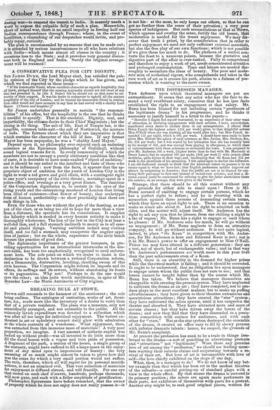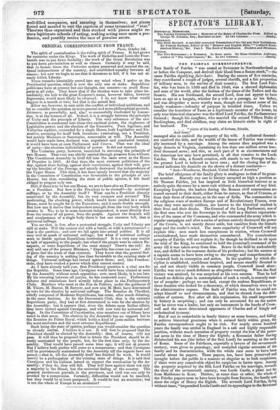THE DISTRESSED MANAGER.
Ting defences upon which theatrical managers are put are extraordinary. It seems that any actor who has the face to de- mand a very exorbitant salary, conceives that he has ipso facto established the right to an engagement at that salary. Mr. Bunn has been blamed for not including certain "professors of the legitimate drama" in his programme, and he thinks it necessary to justify himself in a letter to the papers— "However I might feel myself warranted, by an experience of their utter want of attraction, in declining engagements with such artistes, I have, nevertheless, manifested every desire to include them in n, arrangements. I offered Has Helen Faucit the highest salary (251. per week given to that delightful actress Miss O'Neill when she was drawing all the world ater her; but Miss Fancit de- manded 151 per night, which is 901 per week. I should have been ready to have given Mrs. Nisbett the salary of such actresses as Mrs. Jordan, Mrs. Davison, &c., viz. 251. per week; but I was scared by her intimation that she has recently been in the receipt of 601, and was exempt from playing in afterpieces, in which elm of entertainments both those actresses so enchanted the town. I was prepared to give Mr. Anderson 201. a week, (higher terms than he had with Mr. Macready at Drury Lane); but he required 101 per night, (601. per week I) with certain other drolleries, quite bijoux in their way; and, recollecting that the Kean had 251. per week in the plentitude of his attraction, I felt called upon to decline the difference. I am old-fashioned enough to think that the histrionic talent we possess is by no means equal to what we have lost; that English performers neither improve nor attract by emigrating to America; that the public are not to be blamed for con- fining their patronage to first-rate instead of second-rate artistes; and that a di- rector cannot justly be condemned for refusing to give the latter about three times the salaries, on an average, that were given to the former."
Strange, that there should be all this contest without any real grounds for either side to stand upon I Here is Mr. Bunn accused of omitting to engage certain persons, which he has a perfect right to refuse ; and he is retorting with an accusation against those persons of demanding certain terms, which they have an equal right to ask. There is no occasion to make so much ado about it. Let the right be admitted on both sides, and the matter will adjust itself. Mr. Anderson has the right to ask any sum that he pleases, from one shilling a night' to a lac of rupees; Mr. Bunn has a right to engage or omit whom he pleases: if Mr. Anderson asks too much, he will go without an engagement : if Mr. Bunn neglects to form an attractive company, he will go without audiences. It is not quite logical, indeed, to place "the Kean" in competition with Mr. Ander- son, for Mr. Anderson is here and Edmund Kean is not ; nor is it in Mr. Bunn's power to offer an engagement to Miss O'Neill. Prices too may have altered in a different generation : they are a test, not of merit, but of exchangeable value ; and in that way Mr. Anderson's performances are worth more in this year 1848 than the past achievements even of a Kean. Still, there is an absurdity in the demand for higher prices while the theatrical market is falling ; and it should be corrected. It ought to be understood, that no obligation lies upon managers to engage actors whom the public does not care to Bee;andlersat lesson cannot be taught better than by the course which Afr. Bunn has taken. We believe that managers themselves are charcomeable with creating the present system. They have neglected to cultivate the drama as an art ; they have competed, not to pro- duce plays in the most excellent manner, but to make up puffin advertisements ; they have given to their theatres extraneous an meretricious attractions; they have created the "star" system; they have cultivated the saloon system, until it has outgrown the theatre and absorbed it. They have attracted more and more of certain classes ; but they have driven away the lovers of the drama ; and now they find that they have descended to a preca- rious competition with casinos for audiences, and with each other for "stars." But as the star system destroyed the ensemble of the drama, it created an office easy to fill by showy persons with inferior dramatic talents : hence, we suspect, the grounds of Mr. Bann's complaint. At present the profession has sunk to be a trade in things irre- levant to the drama—a sort of gambling in advertizmg pretexts and "attractions" not "legitimate." Were there any genuine love of art among the "profession," we should see leading mem- bers waiving their ruinous claims and cooperating towards a re- vival of their art. But love of art is incompatible with love of self—the love chiefly exhibited on the stage of our day.
What, then, is a manager to do ? We do not know of any bet- ter example than that which has been set in the modest theatres of the suburbs—a careful getting-up of standard plays with a view to the whole effect. By that means the drama is restored to its primary position ; the actors are again made performers in their parts, not exhibitors of themselves with parts for a pretext. Another step might be, to seek good original pieces, written for
well-filled companies, and amusing in themselves ; not pieces forced and mauled to suit the caprices of some tyrannical "star." 'Theatres thus organized and thus stocked with pieces might re- store legitimate schools of acting, making acting once more a pro- fession, and possibly revive the race of genuine actors.



























 Previous page
Previous page